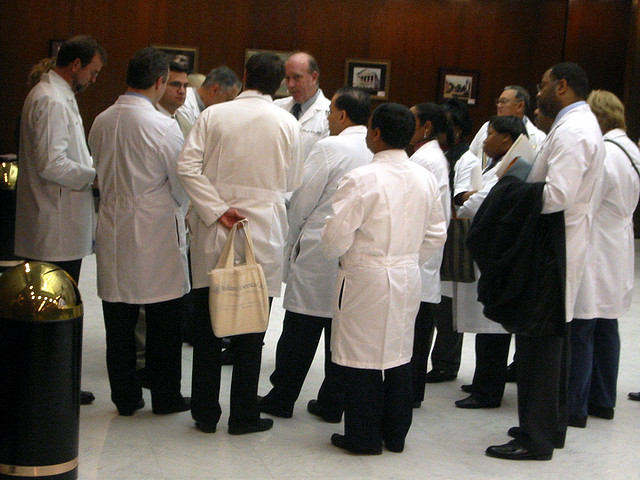Doctor, doctor give the news in English. Posted by Gabriele on Jul 24, 2014 in English Vocabulary
There is a song in English that goes like this:
“Doctor, doctor give me the news I’ve got a bad case of lovin’ you No pill’s gonna cure my ill I’ve got a bad case of lovin’ you”
I think this song about doctors is a good introduction for us to look at the different English names for doctors that give patients news. These specialty names for doctors are good to know in case you ever need to see one of these doctors or if you want to become a doctor yourself.
First let me start out by saying the word “doctor” in English is usually used instead of the word ‘physician,’ by most native English speaker. The word physician though is the more accurate word to describe a person who is qualified to practice medicine. A ‘doctor’ is a more general term used to describe a person who has received a doctorate education, but that doctoral education can be in any field, like physics or English. A medical doctor (MD) is synonymous with the word physician.
Now, let’s take a look at all the specialized physicians that are out there and what they do.
Anesthesiologist – A physician who administers drugs (usually called anesthesia) and monitors patients during surgeries.
Cardiologist – A physician who specializes in diseases of the heart and blood vessels.
Endocrinologist – A physician who diagnoses and treats disorders of the endocrine system, such as diabetes, hormone imbalances, or thyroid disease.
Gastroenterologist – A physician who specializes in diseases of the digestive system, such as in the stomach, intestines, or colon.
Hematologist – A hematologist specializes in diseases of the blood and bone marrow.
Oncologist – A physician who specializes in the diagnosis and treatment of all types of cancers and tumors.
Neonatologist – A physician who cares for premature and ill newborn babies.
Nephrologist – A physician who specializes in diseases of the kidneys.
Neurologist – A neurologist specializes in the diagnosis and treatment of diseases of the brain and nervous system.
Obstetrician/Gynecologist – A physician who specializes in the medical and surgical care of the female reproductive system.
Ophthalmologist – An ophthalmologist provides eye and vision care and surgery when needed.
Otolaryngologist – This is the technical name for an ear, nose, and throat physician, and Otolaryngologist is more commonly called an “ENT” (for ear, nose, and throat).
Pediatrician – This is a physician who specializes in the medical care of children.
Podiatrist – A physician who specializes in treating problems in the foot and ankle.
Pulmonologist – A physician who specializes in treating problems in the lungs.
Rheumatologist – A rheumatologist specializes in diagnosing and treating diseases of the joints (i.e. arthritis) and autoimmune disorders (i.e. lupus).
Other types of physicians you might hear of:
Family medicine doctor – A physician who provides continuing, comprehensive health care to individuals and families.
Primary Care Physician – This is a physician who is often the first contact person a patient has if they have questions about their health. This physician also often provides continuing or regular care.
You may have noticed that many of the specialty doctor names listed above end with the suffix –ist. This is not a coincidence. The suffix –ist means ‘a person how practices or is concerned with something.’ It is often used when describing a profession.
If you were a doctor, which type would you like to be? Which type would you definitely not want to be?

Build vocabulary, practice pronunciation, and more with Transparent Language Online. Available anytime, anywhere, on any device.
About the Author: Gabriele
Hi there! I am one of Transparent Language's ESL bloggers. I am a 32-year-old native English speaker who was born and raised in the United States. I am living in Washington, DC now, but I have lived all over the US and also spent many years living and working abroad. I started teaching English as a second language in 2005 after completing a Master's in Applied Linguists and a Certificate in English Language Teaching to Adults' (CELTA). Since that time I have taught ESL in the United States at the community college and university level. I have also gone on to pursue my doctorate in psychology and now I also teach courses in psychology. I like to stay connected to ESL learners around the world through Transparent Languages ESL Blog. Please ask questions and leave comments on the blog and I will be sure to answer them.




